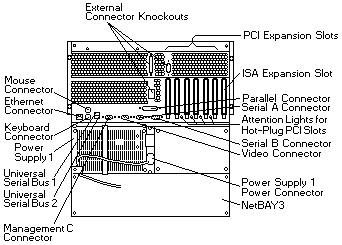|
|

ISA Expansion Slots The server has one industry standard architecture (ISA) expansion slot.
Many adapters provide bus-master capabilities, which enable the adapters to perform operations
without interrupting the system microprocessors.
Keyboard Connector: The keyboard cable connects
here.
Mouse Connector: The mouse cable connects here.
This port sometimes is called an auxiliary-device or
pointing-device port.
Serial Connectors: Serial signal cables for modems
and other serial devices connect here to the two 9-pin
serial connectors, ports A and B. See
'Devices and I/O Ports' for port assignment
information. If you are using a 25-pin signal cable,
you need a 9-pin-to-25-pin adapter cable.
Video Connector: The monitor signal cable
connects here.
NetBAY3: The tower model of the Netfinity 5500
comes with a NetBAY3 attached. You can install
devices, such as the IBM EXP10 or a power
distribution unit, in the NetBAY3. Refer to
'Installing Devices in the NetBAY3' for more information.
Management C Connector: This connector is used
to attach a modem that is dedicated to
communication with the system management
processor.
Parallel Connector: A signal cable for a parallel
device, such as a printer connects here.
Universal Serial Bus Connectors: You can attach
I/O devices to these two universal serial bus (USB)
connectors. You need a 4-pin cable to connect
devices to USB 1 or 2.
Note:
If a standard (non-USB) keyboard is attached to
the keyboard port, the USB ports are disabled
while the power-on self-test (POST) is running
and no USB devices will work during POST.
Ethernet Connector: The server has one RJ-45
Ethernet connector. This connector is for attachment
of the network to the integrated 10BASE-T or
100BASE-TX, twisted-pair transceiver.
Expansion Slots: The server has one industry
standard architecture (ISA) expansion slot and six
peripheral component interconnect (PCI) expansion
slots. Four of the PCI slots support hot-plug PCI
adapters.
You can install PCI or ISA adapters. Many adapters
provide bus-master capabilities, which enable the
adapters to perform operations without interrupting
the system microprocessors.
Attention Lights for Hot-Plug PCI Slots: Each
hot-plug PCI slot has an Attention light that is visible
from the rear of the server. An Attention light flashes
approximately once per second when it is on. The
meaning of the Attention lights is defined by the
operating system. Refer to the operating system
documentation to determine if it supports hot-plug PCI
adapters and, if so, what the Attention lights indicate.
Power Connector: The power cord for power supply
1 connects here. (The power connector for the
additional optional power supply is covered by the
filler panel.)
External Connector Knockout: The server has
three external connector knockouts that can be used
when you install options, such as the external SCSI
cable option.
The 5500-M20 Type 8662 server has only one external connector knockout
that can be used when installing options.
The lower Connector Knockout (see artwork) is used for the Management RS-485 Connector
This connector is for connecting rack or multirack systems through a daisy-chain cable in half-duplex mode.
The top, left Connector Knockout (see artwork) is used for the SCSI Connector External SCSI devices attach here.
Note:
For pin assignments and other details about these
connectors, see 'External Options'.
Please see the LEGAL - Trademark notice.
Feel free - send a  for any BUG on this page found - Thank you.
for any BUG on this page found - Thank you.